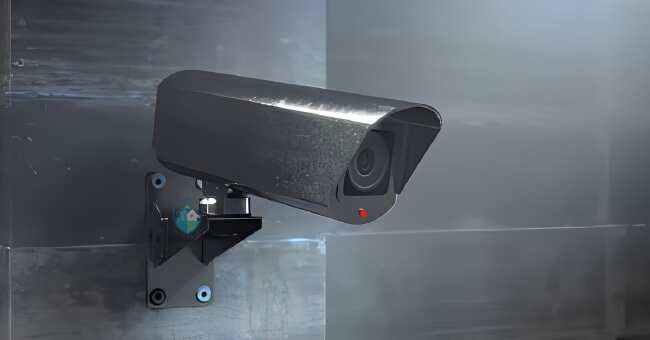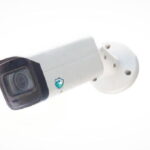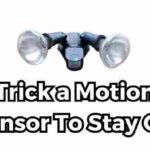Table of Contents
Have you ever wondered can security cameras see in the dark of night just as well as during the bright light of day? I know I sure have!
As someone who wants to feel completely secure at home at all times, I decided to do some serious research into night vision capabilities for security cameras.
I wanted to find out if the camera surveillance I rely on so heavily during my waking hours would still be effective after the sun goes down.
In this post, I’ll share everything I learned during my epic quest to understand night vision for security cameras.
You may be surprised by what today’s latest camera technologies can accomplish in low light and total darkness!
How the Eye Sees Versus a Camera at Night
Our eyes and vision work very differently than a camera and video recording.
Let’s quickly compare:
- Human eyes use photoreceptor cells called rods and cones to detect light and see.
- Camera sensors capture light through lenses and convert it into digital video signals.
Here’s the catch – both our eyes and cameras need a certain amount of light to see properly.
When light dims in the evening or goes out completely at night, human vision gets weaker and grainier. We can’t see details, colors disappear, and shadows obscure objects.
The same limitations apply to standard security cameras that rely purely on visible ambient light.
Just like our eyes, the low light visibility of a normal camera starts dropping off after dusk.
Video footage becomes dark, blurry and full of visual noise in low light conditions.
Eventually, both human and camera eyes are rendered almost useless when it becomes completely dark.
Luckily, we innovated a clever solution to the problem of fading light – night vision!
Special cameras have optics and sensors that allow seeing even with miniscule amounts of light, or none at all.
Keep reading to understand night vision technologies that enable security cameras to see as clearly at midnight as they do at noon.
Infrared Cameras Reveal the World After Dark
Infrared (IR) illuminators are the secret sauce that empowers cameras to see in the dark. Let me explain how they work their magic:
- IR illuminators shine invisible infrared light into a scene just like a flashlight.
- This IR light reflects off objects and illuminates the area, undetectable to our naked eyes.
- The security camera sensor detects the IR light and uses it to capture crisp, bright black and white video as if in daylight.
So even when ambient visible light is scarce or non-existent, an infrared camera has its own controllable light source bathing the entire scene.
The result is clear night vision footage revealing everything in range of the IR spotlight.
Many home security cameras integrate IR LED illuminators directly on the camera body itself.
More advanced systems mount, adjustable IR spotlights nearby to maximize night vision range and image clarity in extreme low light.

This ingenious IR illumination method allows surveillance cameras to see not just in low light, but in literally zero ambient light conditions. It’s like having night vision super powers!
Now let’s examine other important factors that determine how far and how well a night vision security camera can see after the sun goes down.
Key Specs for Night Vision Camera Performance
Not all security cameras are created equal when it comes to low light video capabilities. Here are the key technical specifications you should look for:
- Camera Resolution – Measured in megapixels or MP, higher resolution sensors can capture more detail in a dark scene. Aim for at least 1080p HD resolution or higher.
- IR Illuminator Strength – More LEDs and higher power IR lights extend night vision range. 40-60′ is ideal for most homes.
- Night Vision Distance – The maximum area an IR camera can cover at night. Ranges from 30-200’+ for consumer models. Wider is better for full property coverage.
- Low Light Rating – This measures the minimum amount of light needed by the camera, rated in lux or moonlight mode. Lower lux requirements deliver better night vision. Look for at least .01 lux or lower.
- IR Wavelength – IR illuminators shine light from 850-950 nanometers. 850nm is visible to some animals but harder to detect. 940-950nm is completely invisible to humans and animals.
Considering these specifications will help you choose a security camera optimized for surveillance in dark environments.
Models marketed specifically for night vision will excel in terms of low light clarity and IR illumination distance.
Camera Settings That Enhance Night Vision Capabilities
Beyond finding the right camera hardware, there are some settings you can adjust to maximize night vision performance:
- Set the camera to night mode to activate IR lights when ambient light is low. For 24/7 systems, choose auto mode.
- Position the camera with the widest possible field of view to maximize visibility.
- Angle the camera downward around 10-15° to avoid glare from IR lights.
- If available, expand the camera’s dynamic range, which improves contrast in low light.
- Increase the exposure time to allow more light onto the camera sensor with each frame.
Adjusting these parameters will help your cameras capitalize on built-in night vision features after the sun sets.
Next let’s talk about ideal placement for security cameras to monitor your property in the dark.
Tips for Mounting Cameras for Night Surveillance
Here are my top tips for positioning night vision security cameras to get the very best low light monitoring capability:
Choose strategic locations
Point cameras toward key areas like doorways, gates, driveway entrances where intruders are likely to approach.
Avoid aiming at bright lights which could cause glare and compromise video.
Elevate cameras
Mounting cameras higher gives a wider vantage point and minimizes obstructions from yard shrubs and foliage that can block the IR light beam.
Supplement with external IR spotlights
For extremely large, dark spaces, adding powerful external infrared illuminators can complement built-in camera IR LEDs.
Overlap multiple camera views
Place cameras so their night vision ranges overlap for full property coverage with no blind spots or shadows.
Verify night vision range
Test cameras after installation to confirm the night vision distance and image clarity meets expectations before finalizing placement.
Proper mounting locations will allow your night vision security cameras to deliver 24/7 surveillance to keep your home or business protected, even after hours when the lights go out.
Now let’s highlight some top-rated night vision camera models on the market from leading brands.
Best Night Vision Security Cameras
These are my picks for top-performing IR cameras that excel at seeing in the dark:
Arlo Pro 3
- 2K HDR video resolution
- Color night vision mode
- 160° diagonal field of view
- IR illumination up to 25 feet
- Weatherproof for outdoor/indoor use
Ring Spotlight Cam
- 1080p HD video
- Infrared + LED spotlights
- Motion-triggered alerts
- 130° field of view
- IP65 weather resistance
Nest Cam Outdoor
- 1080p HD/30fps live streaming
- 8x digital zoom with HDR
- Night vision up to 50 ft
- 130° diagonal field of view
- Weatherproof IP65 rated
EufyCam 2C
- 2K resolution with Sony lens
- Night vision up to 100 ft
- 365 day battery life
- IP67 weatherproofing
- Starlight low light sensor
Swann 4K Thermal Camera
- Heat-sensing thermal imaging
- 4K Ultra HD recording
- Advanced motion detection
- IP66 weather resistance
- 130° wide viewing angle
Any of these systems will provide excellent low light monitoring and night vision recording to keep your home or business safe around the clock.
For smaller spaces, compact indoor cameras like the Nest Indoor Cam or Wyze Cam offer affordable night vision surveillance.
There are also wildlife cameras specialized for capturing nocturnal animal activity in the dark.
With the right gear, you can rest easy knowing your property remains protected even after the sun sets.
Eliminate Vulnerabilities by Securing the Night
A wise person once told me, “An ounce of prevention is worth a pound of cure.”
When it comes to home security, detecting and deterring prowlers in the dead of night is much preferred over dealing with the aftermath of a break-in or theft.
Upgrading to a modern security camera system with excellent night vision capabilities allows you to see threats coming and react quickly even in challenging low light conditions.
Can Security Cameras See In The Dark?
So if you’re wondering “Can security cameras see in the dark?“, the answer is a resounding YES!
Surveillance cameras equipped with infrared illuminators deliver crisp, detailed black and white video 24 hours a day.
They’re like robotic security guards with superhuman night vision who never sleep on the job!
No longer do you have to feel vulnerable or blind to activity on your property after sunset.
Night vision security cameras provide peace of mind and allow you to see precisely what’s happening around your home or business even when it’s pitch black outside.
That’s the ultimate dream for security-conscious homeowners like myself!
FAQs
Do Security Cameras Light Up At Night?
Many home security cameras today have night vision capabilities that allow them to see in the dark.
To enable night vision, security cameras will emit infrared light that is invisible to the naked eye, but detectable by the camera sensor.
So security cameras themselves do not visibly light up, but they project infrared illumination that allows them to see at night.
The infrared light reflects off surfaces similar to how a flashlight works. Most security cameras will switch to infrared mode automatically when ambient light dims below a certain threshold.
Dome cameras and bullet cameras have IR LEDs built into the camera housing itself.
These integrated infrared lights are sufficient for smaller monitoring ranges of 25-50 feet.
For more heavy-duty surveillance, standalone IR spotlights can provide fuller coverage of large outdoor areas with night vision distances over 100 feet.
So in summary, security cameras use infrared technology to see in the dark, but don’t visibly light up.
The night vision capabilities come from IR lights embedded on the cameras or mounted nearby.
Are Home Security Cameras Night Vision?
Nowadays most indoor and outdoor home security cameras have standard night vision features.
This allows them to provide clear video monitoring 24/7, even in low light or complete darkness.
Here are some things to look for in a home security camera system with good night vision:
- Infrared illumination – IR LEDs or spotlights to light up the scene invisibly using infrared wavelengths
- Low light sensor – High quality image sensor rated for good low light sensitivity
- 1080p or 4K resolution – Sharp video quality with plenty of detail in dark conditions
- 25-50 ft night vision range – Can cover typical home exteriors and backyards
- Smart IR mode – Automatically activates infrared illumination when ambient light is low
- Starlight or low light certification – Signifies camera is optimized to see at night
So when shopping for home security cameras, look for models specifically geared for night vision.
Most reputable security camera brands like Arlo, Ring, Nest, Eufy, and others offer excellent night vision features right out of the box.
Do Outdoor Security Cameras Have Night Vision?
Outdoor security cameras virtually always come equipped with night vision technology these days.
Seeing clearly after dark is an absolute must for any camera that will be monitoring a property exterior, backyard, driveway, or other areas outdoors.
Here are some standard night vision specs for outdoor security cameras from top brands:
- Infrared LEDs – IR lights built into camera housing
- Field of view – 100-130° for wide visibility
- Night vision distance – 50-200 ft range
- 1080p High Definition – Sharp details in low light
- Weatherproof – Withstands humidity, rain, snow
- Smart IR mode – Automatically activates at night
- Motion detection – Alerts when movement occurs
Without night vision, outdoor cameras would be blind in the darkness.
So you can be confident that wireless outdoor security camera systems with WiFi or ethernet connections will work just as well at midnight as they do at noon for 24/7 monitoring.
Can Cameras See In Total Darkness?
The latest generations of HD security cameras are designed to provide clear video with good details – even in complete darkness.
Here are some reasons why today’s cameras excel at seeing in pitch black conditions:
- Infrared illumination from IR LEDs or spotlights amply lights up areas for the camera to see.
- High resolution image sensors (4K or 1080p) have better low light sensitivity and capture more fine detail in the dark.
- Wider dynamic range and starlight technology specifically boosts visibility for low light scenes.
- Powerful processors use image stacking and noise reduction to create clearer night vision video.
- Low light modes automatically activate extra features to maximize clarity at night.
With this perfect storm of technologies, cutting edge security cameras see amazingly well at night while we humans are practically blind.
For the best zero light visibility, look for cameras that advertise night vision, starlight, or extreme low light capabilities.
Can Security Cameras See Phone Screens?
This depends on the resolution of the security camera and how close someone is standing to the camera while using a phone.
Higher resolution cameras like 4K or 1080p will be able to see phone screens better from farther away.
Lower resolution cameras like 720p or below likely could only make out a phone screen if the person was within 10 feet.
For clarity, phone screens are relatively small targets. Facial recognition becomes difficult beyond 20-30 ft even for 4K cameras.
To discern finer details like messages or images on a phone screen, the person would need to be within 10 ft most likely.
With the right camera specs and positioning, it is possible to see phone activity being used in the vicinity.
But screens are small targets compared to larger human forms, so don’t expect great visibility from large distances.
How Do You Know If A Camera Can See In The Dark?
There are certain terminology and specifications to look for when shopping for a security camera that excels at night vision:
- Low Light or Starlight – Specifically denotes camera is optimized for low visibility
- IR night vision – Camera has infrared LEDs for illumination
- Night vision distance – Manufacturer rating for how far IR lights will reach in the dark
- Minimum illumination – Low lux rating like .01 indicates camera needs very little light
- 1080p or 4K – Higher resolution for sharp details in low light
- Wide dynamic range – Helps highlight dark areas and prevent blowouts
- Noise reduction – Produces cleaner video by minimizing grain/noise
If descriptions emphasize great night vision, low light, or infrared – then you can be assured the camera will see well after dark!
Seeking out reviews from other users at night can further verify performance.
Do Security Cameras Work Well At Night?
The latest security cameras work amazingly well at night – often just as good as during the day!
Thanks to IR night vision and low light sensor technologies, features like color night vision, Extended Dynamic Range, and Starlight/Dark fighter modes make modern security cameras extremely capable in dark environments.
As long as the cameras are positioned to avoid glare and harsh backlighting, have sufficient IR illumination coverage, and are dialed into optimal settings – they will provide clear and usable black and white footage 24 hours a day.
Proper night vision equipment allows security cameras to work just as effectively after sunset as they do in daylight.
You can count on round-the-clock recording and motion alerts to keep your property securely monitored even when it’s dark outside.
Can Security Cameras See Through Windows At Night?
Security cameras can potentially see through windows at night, but glass will reflect a lot of the infrared light back and can appear as a bright, opaque surface to the camera.
For the best chance of seeing through windows at night, position the camera at oblique angles to avoid directly facing window glass which could cause IR glare.
Ideally place cameras perpendicular to windows on adjacent walls pointing toward the interior.
Cameras with wide dynamic range capabilities can better expose for both bright IR reflections and darker interior spaces simultaneously.
Higher resolution imaging also captures finer details through glass at night.
Depending on the camera specs and positioning, dome cameras or bullet cameras potentially can see inside through windows after dark when calibrated properly.
But the glass itself will obstruct a clear line of sight when hit directly with infrared illumination.
Strategic placement helps mitigate IR glare off the windows for the best night vision possible.
Conclusion
Choosing security cameras with excellent night vision used to watch over your property through the darkest nights can give you great peace of mind.
Look for cameras with powerful infrared illumination to capture details up to 100 feet away or farther, so you can protect your family or business around the clock.
Allowing night vision surveillance cameras to act as your eyes when you sleep safe inside is a wise investment in security that pays off in valuable footage and deterrence when you need it most.




